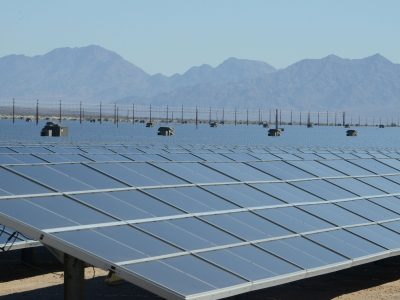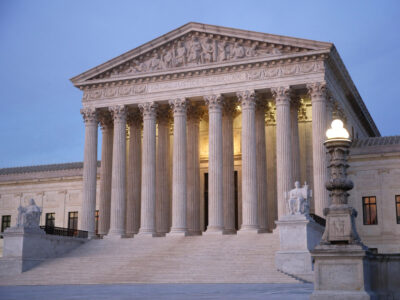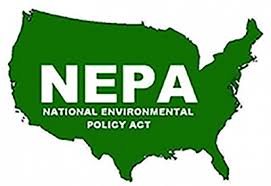statutory interpretation
The Color PURPA
A Win for Solar– And a Glimpse of Life After Chevron
The majority in a recent case — an Obama appointeet and a Trump appointee — ruled in favor of renewable energy. Even without Chevron deference, they were able to conclude that the statute favored solar producers. And unlike a win under Chevron, this one can’t be reversed by a more conservative agency — it’s etched in stone.
CONTINUE READINGDoes Federal Law Still Preempt State Standards Relating to Fuel Efficiency?
The answer may depend on what being “in effect” means.
If a tree falls in the forest but no one hears it, does it still make a sound? If a law hasn’t been formally repealed but can be violated with complete impunity, is it still in effect? This matters because federal law preempts state fuel efficiency standards if, but only if, a federal standard is “in effect.” Congress just eliminated any penalty for violating the federqal standards. Which means at best they have only a kind of ghostly existence, but no substance to speak of.
CONTINUE READINGNo, DOE, You Can’t Roll Back Product Efficiency Standards
Congress wanted greater energy efficiency over time and banned rollbacks.
The Department of Energy is proposing to rescind key energy efficiency requirements. It is beyond ironic that it is attempting to do so at a time when the President has proclaimed an energy emergency. Trump says the grid is struggling desperately to meet surging power demand. That’s a strange time to eliminate regulations that are saving energy. DOE’s action is also illegal, because the law in question has a provision prohibiting rollbacks. Congress wanted efficiency standards to get tougher over time and included an anti-rollback provision to make sure of that.
CONTINUE READINGNEPA in the Supreme Court (Part III)
Our guide to understanding how causation applies for NEPA reviews.
Overall, the Supreme Court has articulated a functional approach that is based on the purposes of NEPA, based on the structure and text of the statute. Today’s post will lay the foundation by discussing NEPA’s purposes and how they differ from those of another area of law often used as an analogy, tort law
CONTINUE READINGJudicial Review After Loper Bright
We used to have the Chevron test? What test do we have now?
Loper Bright has created a new two-part test for courts to apply when an agency has interpreted a statute. It’s not the same as Chevron, but it does have some family resemblance.
CONTINUE READINGIs the Sky Falling? Chevron, Loper Bright, and Judicial Deference
Perplexed? Worried? Here’s a guide to a fraught area of law.
If you’re confused about the Supreme Court’s ruling, you’re not alone. Scholars will be discussing the recent ruling for years. It clearly will limit the leeway that agencies have to interpret statutes, meaning less flexibility to deal with new problems. But unlike many commentators, I don’t think the sky is falling. I was teaching environmental …
Continue reading “Is the Sky Falling? Chevron, Loper Bright, and Judicial Deference”
CONTINUE READINGThe Supreme Court’s Top-10 Environmental Law Decisions
If these decisions had come out differently, environmental law would look very different than it does today.
Here’s what you really need to know about the Supreme Court’s rulings on environmental law — including its recent trend toward weakening environmental protection.
CONTINUE READINGJudicial Deference to Agencies: A Timeline
Decisions about judicial deference to agencies on legal issues didn’t begin or end with Chevron.
The Supreme Court is about to make a major decision about the balance of power between courts and agencies like EPA. Here’s what you need to know about the history if the issue to understand what’s going today.
CONTINUE READINGDeciphering NEPA 2.0
Here’s everything you wanted to know about the “New NEPA” but were afraid to ask.
NEPA was long an island of legal stability, standing almost unamended for over a half century. Then in the summer of 2023, everything changed. As a rider on the agreement to raise the debt ceiling, Congress extensively rewrote and expanded NEPA, gifting us with a new statutory regime. As I’ve written before — and discuss …
Continue reading “Deciphering NEPA 2.0”
CONTINUE READINGMore Unforced Errors in the 2023 NEPA Amendments
Bluntly speaking, the statute is a mess.
When the 2023 amendments to NEPA passed as part of the debt ceiling bill, I wrote a series of blog posts about the drafting errors. It turns out that I missed some, as I discovered when working on the new edition of my environmental law casebook. They really aren’t all that subtle, and it’s hard …
Continue reading “More Unforced Errors in the 2023 NEPA Amendments”
CONTINUE READING











